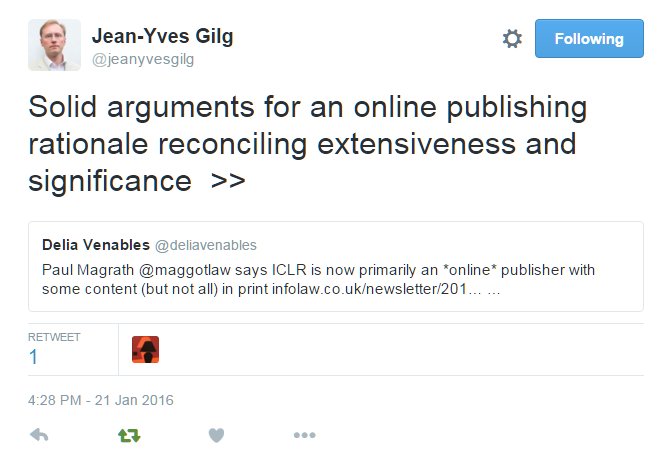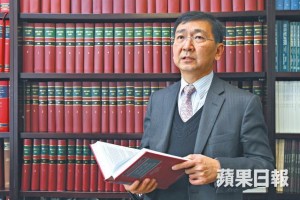Weekly Notes: legal news from ICLR – 22 January 2016
The week’s roundup of legal news and comment includes the Miranda case on the use of anti-terror law against journalists, calls for change in the law on sexual offences, a discussion of the pros and cons of print and digital media and of printing on vellum or paper, and, in our international section, some egregious… Continue reading about Weekly Notes: legal news from ICLR – 22 January 2016
The week’s roundup of legal news and comment includes the Miranda case on the use of anti-terror law against journalists, calls for change in the law on sexual offences, a discussion of the pros and cons of print and digital media and of printing on vellum or paper, and, in our international section, some egregious disappearances from Hong Kong.
Miranda case

Legality of stop and search and the meaning of terrorism
On 19 January the Court of Appeal ruled that police investigating the theft and leaking of data from the US National Security Agency by Edward Snowden acted legally when using anti-terror legislation to justify stopping and questioning, and removing evidence, from David Miranda at Heathrow airport in 2013. Miranda was carrying an encrypted copy of the data to assist the journalistic activity of his spouse, Glenn Greenwald of the Guardian newspaper. The grounds of Miranda’s challenge to the legality of his detention and questioning, and the relevant statutory provisions, are set out in the case note by Daniel Hoadley on this blog, which also sets out the main points of the decision.
You can read the court’s own summary here and the full judgment on BAILII: R (Miranda) v SSHD [2016] EWCA Civ 6.
The case has attracted commentary for two reasons.
First, the declaration of incompatibility (with the Human Rights convention) which the court made in relation to the power to stop and search. Although such a declaration does not in itself render the exercise of the power unlawful, it suggested a fundamental contradiction in the court’s reasoning, argued Carl Gardner on his Head of Legal blog, where he has been following the Miranda case for some time: see The self-contradictory Miranda appeal ruling
Another blog, Predictable Paradox, written by Graeme Cowie, did not agree: Miranda and Legality
See also the short “Law and Policy” note by David Allen Green in the Financial Times at the end of its news report of the case: UK court criticises anti-terror legislation
The effect of the declaration of incompatibility seemed to have been misunderstood in some reports, which suggested that it would “force government ministers to re-examine the Act” and “the law will have to be changed”. Conor James McKinney debunked this particular misunderstanding in a post on Full Fact,Miranda’s rights: will the Terrorism Act be changed?
The second point of interest in the case was the definition of “terrorism” which, according to Carl Gardner in a further post on Head of Legal, the court has now narrowed, in response to the argument of Matthew Ryder QC for Miranda, to involve a less literalistic test and to require a mental element. Gardner concludes:
And this ruling on the meaning of terrorism, not having been decisive in the appeal, does not in itself create legally biding precedent for the courts of the future. Nonetheless, if it is followed—particularly if it is approved on this point by the Supreme Court, which seems to me likely—this may represent the most important aspect of the case, and a significant victory for critics of Britain’s tough terrorism legislation.
Sexual offences
(1) Fresh calls for anonymising defendants
The acquittal of a student for offences of rape and sexual assault and the dropping of charges for historic sexual offences against a senior retired military gentleman (neither of whom I propose to name) has prompted, once again, calls for a change in the law to preserve the anonymity of those accused of sexual offences as well as those who complain of them (the alleged victims). The effect of such an accusation can, of course, be devastating and in view of the notoriously low rate of conviction there must always remain a suspicion, despite acquittal, that lack of sufficient proof of guilt is not necessarily proof of innocence. (The same notoriously low rate of conviction, and its effect on the likelihood of cases being reported in the first place, is usually cited to support the anonymisation of complainants.)
Writing in the Times Law Brief newsletter on 15 January, Mary Jane Mowat, a retired judge, said this week that sexual offence defendants should be anonymous unless and until convicted. No argument in favour of naming them before conviction, let alone before charging, would not work just as well if wait till after conviction. A sort of equality of arms argument, since the complainant is anonymous unless they choose to identify themself. The alternative would be no anonymity for either party, but that would deter complaints, she said.
I do not subscribe to the view that to give such anonymity would be the thin end of a “secret justice” wedge, any more than is that given to complainants. It strikes me this argument is primarily advanced by the tabloids (and other media) reluctant to forgo their salacious column inches. It is notable how any sex case involving a public person or one connected to royalty, the aristocracy, or one of our more prestigious universities gets blow-by-blow coverage, when the everyday sex case does not.
The other argument for naming defendants, and even suspects not yet charged, is that it will encourage other “victims” to come forward. Maybe this held good in some of the dwindling celebrity prosecutions (though I fear it also encouraged a few bandwagon-jumpers).
But if a celebrity were convicted and named after one trial there would be nothing to prevent any ensuing allegations being pursued. The conviction and the evidence in the first trial would likely be admissible in any subsequent one, adding strength to the case without loss of justice.
(2) Janner saga continues
Following last year’s rollercoaster ride in which Lord Janner, a bit like someone being assessed for work by Atos, having initially been considered unfit to plead to allegations of historic sexual offences by reason of his advancing dementia, was then, following a review, declared fit to plead, before finally being declared unfit after all, and then, as if to confirm the point, dying, after which calls for him to be tried even in absentia continued until this year, when the court finally declared there would not, after all, be a “trial of the facts”… after, as I say, all this, there has been yet another development in the case. We now have Henriques report.
Published on 19 January, the report of Sir Richard Henriques, following An independent inquiry into allegations made against Lord Greville Janner (PDF) runs to 46 pages. But, says Anna Raccoon on her blog, the mainstream media have reduced this to:
“Lord Janner: CPS and police were ‘wrong’ not to prosecute earlier, says official report”.
Obviously there’s a lot more to it than that, but few can be bothered to go into the complexities of the case. The popular view, in today’s climate of suspicion (and some of Janner’s conduct was undoubtedly suspicious – though whether it was more than that requires something called proof) is that he was an ‘evil pervert’, and that he was ‘protected’ by the establishment. There’s no point in my trying to precis Anna’s analysis, it would be just as tersely glib as the media reductionism.
Also well worth reading, if you can stand the decidedly mixed blessing that is the Daily Telegraph these days, is Matthew Scott’s sceptical riposte to the mob view: There is no evidence of an establishment conspiracy to protect Lord Janner. But nobody cares. Next to the piece is a helpful timeline listing all the occasions when something could and perhaps should have been done and yet wasn’t, but even despite the many manifest failures of the police and CPS to get a grip on the case, Scott, a barrister, is doubtful whether a conviction was as certain as everyone now seems to believe. The point, however, is that the alleged victims would have had their day in court, which they must now spend, instead, presenting their evidence to the Goddard inquiry.
Digital vs Print
ICLR offers the best of both worlds
This month ICLR launches a major extension to its content on ICLR Online.
- First, all the new transcripts added to BAILII from the High Court, Employment Appeal Tribunal, Court of Appeal, Supreme Court, Privy Council and the European Court of Justice was be automatically indexed in our Citator+ online index and links provided via the most common Neutral Citations to the judgment on BAILII.
- Secondly, we will also be uploading copies of the official transcripts of these and other cases, not on BAILII, so they will accessible within the online service.
- Thirdly, we have redesigned the layout of the free case summaries, the WLR Daily, so they read more like a proper headnote and act as a sort of advance version of the full text case report.
- Finally, and perhaps most importantly, we will be expanding the coverage of the online edition of the Weekly Law Reports by including many cases which the print edition would not have space for. These will be cited as [year] 4 WLR # (where # is a sequential case number rather than a page). Expect to find a lot more coverage in areas like Family, Crime and Shipping where, traditionally, a specialist publication would have supplemented the core coverage of our generalist series.
A number of readers have expressed concern over the idea of online-only law reports, demonstrating what I have described, in a piece for the latest issue of the Internet Newsletter for Lawyers, as “the anxiety of impermanence”. As services like BAILII andlegislation.gov.uk demonstrate, there are huge benefits to be gained from vast digital archives of easily searchable content; but risks associated with the permanent accessibility of digital content are by no means fanciful, as was demonstrated by the temporary disappearance last November of the official Leveson Inquiry website, lock, stock and barrel-loads of evidence. It turned up soon enough, relocated to a virtual basement of the National Archives.
Quite apart from the risk of loss, or loss of access, there is the simple matter of preference. Many, while happy enough to take advantage of digital tools to search for documents, prefer to read them in hard copy. No problem. All the cases on ICLR Online can be printed out, many of them in official court-ready PDF format, a facsimile of the printed page. Moreover, later this year we are developing a tool for printing the contents of a Citator+ overview, or “index card”, ie all the citations, subject matter records and considerations of cases and legislation associated with a particular case, in one document. This has been something requested particularly by librarians. If you have any suggestions for how ICLR Online can be improved, do please let us know, via inquiries@iclr.co.uk. If you would like a free trial of the service,apply here.
News of these developments has been well received


Vellum vs Archive paper
One thing I don’t think we’ll ever develop, in this day and age, is a facility to print our law reports onto vellum. I mention this because, traditionally, the statutes of the realm, Public Acts of Parliament, have been printed (or originally written) on vellum, which is made from calf skin. The decision to print them on vellum, instead of writing them by hand (or “ingrossing” them) onto parchment rolls thereof, was taken in 1849, by resolution of both Houses of Parliament. You can imagine them in their top hats, with their fob watches and mutton-chop whiskers, thinking themselves frightfully modern, to be sweeping away this archaic practice of scratching legislation onto vellum with a bird’s feather (quill pen) when you could be firing up those dark satanic printing presses and getting it all done with modern machinery!
Well, our own dear legislators, or some bean-counting little committee thereof, have now decided to be a bit modern and, with nary a top hat in sight, get rid of this fussy old vellum stuff. to be precise, The House of Commons Administration Committee published a report in October last year, “agreeing to a renewed request from the Chairman of Committees of the House of Lords for the assent of the Commons to a change to printing record copies of public Acts on archival paper instead of vellum”.
Switching from vellum to high quality archival paper would, on a conservative estimate, save approximately 80% on current costs – or around £80,000 per year, the committee chairman said. You can read all about it in a House of Commons Library Research Briefing Paper, published on 7 January: Vellum: printing record copies of public Acts.
However, you might want to question the amount of the estimated saving, since it might be as little as £27,000, as Patricia Lovett explains in her informative blog post, Vellum and Acts of Parliament. (Hat tip to @otium_Catulle).
Law (and injustice) around the world
China and Hong Kong
Mystery of disappearing booksellers
A number of publishers and booksellers based at the Causeway Bay Books bookstore in Hong Kong have mysteriously disappeared in recent months, only to reappear in China where in some cases they have issued what colleagues and relatives think are probably not genuine “confessions”. They work for the Hong Kong-based publishing house Mighty Current, known publishing books critical of China. At least one of them has a British passport, and another a Swedish. According to the Guardian (4 Jan) ,
The missing include Gui Minhai, a publisher known for his exposés of the lives of senior Communist party leaders, who was taken from his seafront holiday home in Thailand on 17 October. [On 30 December] Lee Bo, Gui’s 65-year-old business partner, also went missing in Hong Kong, prompting protests from pro-democracy politicians who fear Beijing is responsible for what they call a wave of kidnappings.
British officials confirmed next day that Lee Bo had a British passport. During a recent visit to Beijing, Philip Hammond, the British foreign secretary, said that if Chinese authorities had been responsible for Lee’s disappearance it would represent an “egregious breach” of Hong Kong’s supposed autonomy from the authoritarian mainland, the Guardian reported on 17 January.
The Chinese authorities having declined to comment on the disappearances for many weeks, then broadcast a what it said was a confession made by Gui on state broadcaster CCTV, in which he said he’d handed himself in to the authorities in connection with an alleged hit-and-run death in Ningbo back in December 2003.
A couple of days later, Chinese security officials confirmed to the Hong Kong government that Lee Bo was in China, supposedly having gone voluntarily, despite not having appropriate travel documents with him at the time of his disappearance, and without telling his wife, who confirmed the handwriting in a letter from him (saying he had gone voluntarily) was genuine.
The disappearances have sparked protests and demonstrations in Hong Kong, as well as a lot of very cynical comments about China’s alleged but often hard to detect respect for the rule of law. (As the saying goes, One Nation Two Systems – one lawful, the other simply awful.)
Further reporting: Hong Kong Free Press, Chinese police confirm missing bookseller Lee Bo is in mainland, 17 days after HK enquiry.

HK Law Society’s new exam slammed
From 2021 any law students seeking to become trainee solicitors in the territory must pass a new qualifying exam, the Common Entrance Examination (CEE) set by the Law Society of Hong Kong. This has angered the University of Hong Kong Faculty of Law, since the announcement was made by the Law Society while a review into legal education, begun last October, has yet to be completed by the Standing Committee on Legal Education and Training.
Currently, prospective solicitors must graduate from an LLB or JD programme in Hong Kong or another common law jurisdiction, then complete the Postgraduate Certificate in Laws (PCLL) and pass the internal examination set by schools before becoming a trainee solicitor. Under the new system students will have to complete the PCLL course but they will not be required to take the examination set by PCLL providers, instead having to pass the new CEE, thus bypassing the examinatory role of the law schools.
The move has been attacked by, among others, the former dean of the University of Hong Kong’s law faculty, Johannes Chan Man-mun (pictured), who said it demonstrated a “conflict of interest” and smacked of “protectionism towards the industry”.
Photo Chan Man-mun Photo: Apple Daily.
Source: Hong Kong Free Press
Chief Executive announces Ivory trade ban
The chief executive, Leung Chun-ying announced this week that his government would put a stop to the legal trading of ivory in Hong Kong, thereby impeding the illegal import of ivory into mainland China. According to TakePart’s news feed,
“The government is very concerned about the illegal poaching of elephants in Africa,” Leung told Hong Kong’s legislative council on Wednesday [13 Jan]. “It will kick-start legislative procedures as soon as possible to ban the import and export of elephant hunting trophies.”
The ivory trade is one of a number that are causing grave threats to the survival of certain species of animal. Another, in which China is particularly implicated, is the trade in wild tiger products, used for allegedly medicinal purposes.
That’s it for now. My thanks to all who led me to stories, mostly my followees on Twitter.
This post was written by Paul Magrath, Head of Product Development and Online Content at ICLR, who also tweets as@maggotlaw. It does not necessarily represent the opinions of ICLR as an organisation. Comments welcome on Twitter @TheICLR.